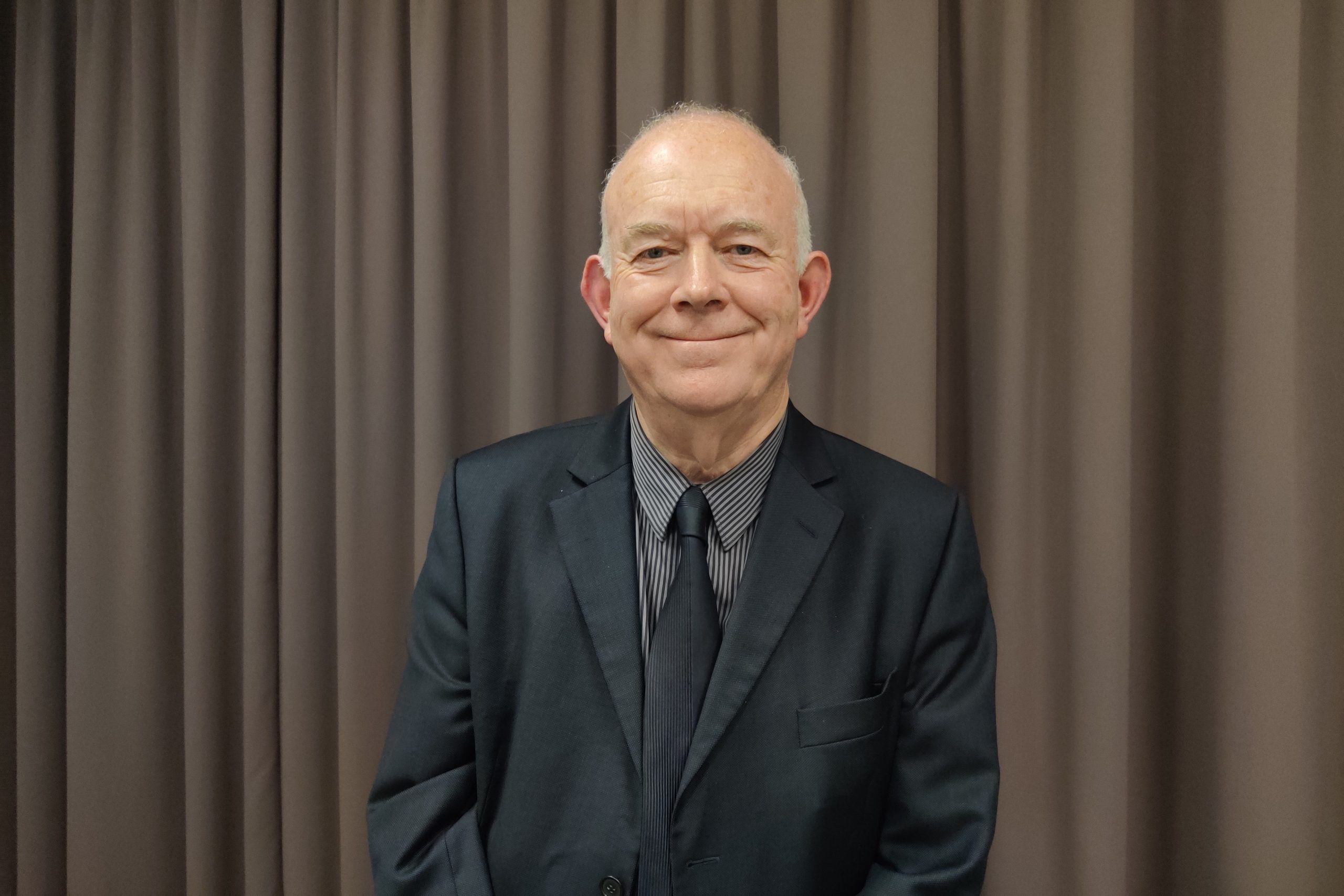Pokalbis su Melvyn Neate, ECIIA Viešojo sektoriaus komiteto pirmininku / Interview with Melvyn Neate, Chairman of ECIIA Public Committee
(English version please check below)
2019 m. lapkričio pabaigoje Vilniuje viešėjo ECIIA Viešojo sektoriaus komiteto pirmininkas Melvyn Neate. Jis atvyko į Vilnių skaityti pranešimą ir dalyvauti diskusijoje apie viešojo sektoriaus audito komitetus. Melvyn pasirodė ne tik kaip profesionalas, noriai dalijantis savo patirtimi vidaus audito srityje, bet ir kaip įdomus žmogus, su kuriuo galima kalbėtis apie keliones, politiką ir kitomis temomis. Jis sutiko atsakyti į klausimus ir plačiau papasakoti Lietuvos Vidaus auditorių asociacijos nariams apie save ir savo patirtį. Taigi malonaus interviu skaitymo!
Šiuo metu esate ECIIA Viešojo sektoriaus komiteto pirmininkas. Anksčiau ėjote JK ir Airijos Vidaus audito instituto pirmininko pareigas, turėjote skirtingus vaidmenis ir pareigas vidaus audito srityje viešajame ir privačiame sektoriuose. Kas yra Melvyn Neate šiandien?
Dabar, kai nebedirbu visą darbo dieną, man pavyksta išlaikyti pusiausvyrą tarp šeimos ir darbo. Aš turiu du anūkus: 3 metų mergaitę ir 9 savaičių berniuką, tad kartu su žmona stengiuosi kiek įmanoma daugiau laiko praleisti su jais.
Darbo srityje mano laikas paskirstomas trimis kryptimis. Pirma, aš turiu apmokamą darbą būdamas Audito komitetu nariu. Antra, aš esu ECIIA Viešojo sektoriaus komiteto pirmininkas . Ir trečia, skaitau daugybę pranešimų įvairiais klausimais, susijusiais su organizacine kultūra, valdymu, rizikos valdymu ir, žinoma, vidaus auditu.
Kuris vaidmuo Jums asmeniškai buvo įdomiausias ir svarbiausias, žiūrint per Jūsų patirties prizmę?
Neišskirčiau kažkurio vaidmens, nes kiekvienas jų buvo man įdomus ir davė naudingos patirties. Žinoma, reikšmingiausias mano vaidmuo buvo paskutinis prieš man pasitraukiant iš Jungtinės Karalystės Mokesčių ir muitų surinkimo departamento vidaus audito direktoriaus pareigų. Organizacijoje su daugiau nei 70 000 darbuotojų ir beveik £500 milijardų „apyvarta“, susidūriau su daugybe iššūkių, tiek sudėtingumo ir įvairovės, tiek masto atžvilgiu. Šiems iššūkiams įveikti turėjau 170 vidaus auditorių komandą, kurie arba jau turėjo reikiamą kvalifikaciją, arba jos dar siekė. Didžiąją savo karjeros dalį praleidęs bankų ir finansinių paslaugų įstaigose, turėjau priprasti prie viešojo sektoriaus kultūros ir etoso bei prie politinės aplinkos, kurioje šis sektorius veikia.
Mano, kaip ECIIA valdybos nario, atstovaujančio JK ir Airijai, vaidmuo pasirodė esąs labai įdomus, nes leido suprasti Europos dimensiją ir daugybę įvairių audito veiklos praktikų. Viena pamoka, kuria norėčiau pasidalinti su jumis, yra ta, kad, nepriklausomai nuo to, kiek esate geri savo veikloje, visada sutiksite kažką, iš ko galite pasimokyti. Gerosios patirties kaupimas ir dalinimasis ja yra tai, ką mes, vidaus auditoriai, turėtume skatinti ir praktikuoti!
ECIIA misija – „būti jungiančiu balsu Europos vidaus audito profesijoje (…)“. Ką tai reiškia žiūrint iš ECIIA Viešojo sektoriaus komiteto perspektyvos? Kokia šiuo metu yra Jūsų svarbiausia veikla Viešojo sektoriaus komitete? Ar yra kokių nors iniciatyvų, kurios gali būti naudingos Lietuvos Vidaus audito asociacijos nariams ar kitoms suinteresuotosioms šalims Lietuvoje?
Kalbant apie viešąjį sektorių, manau, kad ECIIA misija turėtų būti apjungianti vidaus audito profesijoje Europos viešajame sektoriuje. ECIIA siekia skatinti geras valdymo praktikas ir vidaus audito taikymą visuose sektoriuose.
Praėjusios vasaros pabaigoje Viešojo sektoriaus komitetas paskelbė savo pirmąjį pozicijos dokumentą „Audito komitetai Europos viešajame sektoriuje“. Šiame darbe buvo analizuojama padėtis Europos viešajame sektoriuje ir išdėstyti audito komitetų steigimo privalumai. Jame taip pat išdėstytos numatomos kliūtys jų kūrimui. Dokumente pateikiama išvada, kad audito komitetų teikiama nauda žymiai atsveria visus trūkumus, todėl pabrėžiama, kad vidaus auditas turėtų skatinti komitetų įsitvirtinimą Europos viešajame sektoriuje.
Antrasis Viešojo sektoriaus komiteto projektas yra susijęs su integruota atskaitomybe. Šis projektas vykdomas kartu su kolegomis iš EUROSAI. Siekiant nustatyti integruotos atskaitomybės naudojimą Europos viešajame sektoriuje, 2020 m. pradžioje bus vykdoma apklausa, o vėliau taip pačiais metais planuojama paskelbti pozicijos dokumentą.
Trečiasis projektas yra susijęs su vidaus audito standartais viešajame sektoriuje. ECIIA Generalinėje asamblėjoje daugiau nei pusė narių nurodė, jog jų šalyse nėra įteisinti Tarptautiniai standartai. Mūsų projekto tikslas – nustatyti esamą padėtį ir praktiką bei pateikti rekomendacijas ateičiai.
Manau, kad visos šios trys iniciatyvos gali būti naudingos Lietuvos viešojo sektoriaus nariams ir labai džiaugiuosi išgirdęs jūsų nuomonę.
Jūs skaitėte pranešimą ir dalyvavote diskusijoje apie audito komitetus, kurią 2019 m. lapkričio 28 d. organizavo Lietuvos Vidaus audito asociacija ir BICG. Kaip trumpai apibūdintumėte audito komitetų padėtį Europoje? Kokie yra didžiausi iššūkiai viešajame ir privačiajame sektoriuose?
Šiuo metu padėtis Europos viešajame sektoriuje yra labai įvairi, pradedant tokiomis valstybėmis kaip JK ir Prancūzija, kur audito komitetai yra privalomi viešajame sektoriuje, ir baigiant valstybėmis, kur audito komitetai visai neegzistuoja arba jie yra, bet tik valstybės valdomose įmonėse. ECIIA palaiko komitetus, nes tiki, kad komitetai gali atlikti svarbų vaidmenį gerinant organizacijos valdymą. Aiškesnis komitetų veiklos principų ir jų teikiamos naudos supratimas yra tai, ko siekia ECIIA savo veikla.
Kad audito komitetai būtų veiksmingi, jie turi turėti visišką organizacijos valdybos / valdymo organo palaikymą. Jie taip pat turi turėti tinkamas žinias bei reikalingus įgūdžius ir, svarbiausia, sugebėti mesti iššūkį ir užduoti teisingus klausimus. Tai pasakytina ir apie privatųjį, ir apie valstybinį sektorius.
Kokios yra Jūsų mintys po diskusijos dėl audito komitetų Lietuvoje?
Didelis kiekis klausimų parodo aukštą susidomėjimo audito komitetais lygį. Iš pradžių atrodė buvo šiek tiek klaidinga nuomonė apie komitetų vertę, tačiau tikiuosi mano pranešimas ją pakeitė. Praėjo nemažai laiko prieš audito komitetams atsirandant Jungtinės Karalystės viešajame sektoriuje, todėl aš nesitikiu, kad situacija Lietuvoje pasikeis per vieną naktį. Tačiau tikiu, kad vidaus auditas pagreitins pokyčius ir aktyviai palaikys audito komitetų steigimą viešajame sektoriuje.
Dėkoju už pokalbį!
Kalbino Ina Lukošienė, VAA valdybos pirmininkė
Į lietuvių kalbą vertė Olga Bogdanovič, VAA Komunikacijų komiteto narė
CHAIRMAN OF THE ECIIA PUBLIC COMMITTEE MELVYN NEATE: ABOUT BIGGEST CHALLENGES OF INTERNAL AUDIT, ECIIA INITIATIVES AND HEADING THE TEAM OF 170 AUDITORS
In the end of November 2019 Melvyn Neate, Chairman of the ECIIA Public Committee visited Vilnius. He came heres to make a presentation and participate in the panel discussion about Audit Committees in public sector. We found Melvyn not only as a person willing to share his experience about internal audit matters but also interesting person to discuss other topics, such as travelling, politics and other. Melvyn agreed to answer to some questions and to tell more about himself and his experience to the members of the IIA Lithuania – so please enjoy the reading interview with him!
Currently you have a role of Chairman of the ECIIA Public Committee. Previously you have been Chairman of the IIA UK & Ireland, had different roles and positions in internal audit area in public as well as private sector. Who is Melvyn Neate today? Which role you consider as the most interesting personally for you and most important from experience point of view?
Now that I have retired from full time employment, I am able to achieve a good balance between my family and work related matters. I have two grandchildren, a girl aged 3 and a baby boy aged 9 weeks. With my wife, we try to spend as much time with our grandchildren as possible.
Regarding work, my time is split three ways. Firstly, I have some paid employment through my membership of Audit Committees. Secondly, I have a voluntary role as chair of the ECIIA’s Public Sector Committee and thirdly, I give a number of presentations on various subjects relating to organisational culture, governance, risk management and of course internal audit.
Which role do you consider as the most interesting personally for you and most important from experience point of view?
I would not single out any particular role as each has given me something in terms of both interest and experience. Certainly my biggest role was the last one before I retired as Director of Internal Audit for HM Revenue and Customs. With more than 70,000 employees and a ‘turnover’ of nearly £500 billion, there were many challenges, both in terms of complexity, diversity and sheer magnitude. To meet these challenges, I had a team of 170 internal auditors, all of whom were either qualified or studying to be so. Having spent most of my career in banking and financial services, I also had to get used to the public sector culture and ethos as well as the political climate in which it operates.
My role as an ECIIA Board member, representing the UK and Ireland, proved to be one of great interest as it gave me an understanding of the European dimension and the myriad of different auditing operational practices. One lesson that I would like to share is that, however well you think you are doing, there is always somebody somewhere that you can learn from. The capturing of best practices with a view to spreading their adoption is something that we internal auditors should promote and practice!
The mission of the ECIIA is “to be the consolidated voice for the profession of internal auditing in Europe (…)”. What does it mean from the ECIIA Public Sector Committee point of view? What are the most important activities you are currently working within Public Committee? Any initiatives that can be beneficial for the members of the IIA Lithuania or other stakeholder in Lithuania?
Regarding the public sector, I think the ECIIA’s Mission should be to be the consolidated voice of the internal audit profession in the European Public Sector. The ECIIA aims to promote good governance and internal audit in all sectors.
At the end of last Summer, the Public Sector Committee published its first position paper on ’Audit Committees in the European Public Sector’. This paper analysed the situation across the European Public Sector and set out the advantages of establishing Audit Committees. It also set out the perceived obstacles to their creation. It concluded that the benefits derived from Audit Committees far outweighed any disadvantages and consequently advocated that Internal Audit should promote their establishment in the European Public Sector.
The second Public Sector Committee project relates to Integrated Reporting. This project is being carried out jointly with our colleagues from Eurosai. A survey will be sent out early in 2020 to determine the use of integrated reporting across the European public sector with a view to publishing a position paper later in the year.
The third active project relates to intern audit standards in the public sector. At the ECIIA General Assembly, more than half of the members indicated that they had no set standards. Our project will set out to determine the current status, find out existing practices and make recommendations for the future.
I believe that all three of these initiatives could be beneficial to members of the public sector in Lithuania and I very much welcome hearing your views.
You gave a presentation and participated in the discussion about Audit Committees, which was organized by the IIA Lithuania and BICG on 28th of November. How would you shortly describe the state of Audit Committees in Europe? What are the biggest challenges in public sector and private sector?
Currently the position in the European public sector varies significantly, ranging from nations like the UK and France where Audit Committees are mandatory in the government sector to other nations where Audit Committees do not exist or, where they do, have only been established in state owned public enterprises. The ECIIA is promoting these committees because it believes that they can play a significant role in improving governance. A clearer understanding of how these committees work and the benefits they can bring is the basis of the ECIIA’s advocacy effort.
To be effective Audit Committees need to have the full backing of the organisation’s board/ governing body. They also need to have the right membership in terms of knowledge, skills and, most importantly the ability to challenge and ask the right questions. This is true of both the private and public sectors.
What are your reflections after this discussion?
There seems to be a keen interest in Audit Committees as demonstrated by the numerous questions. Initially, I believe that there were some misconceptions as to their value which I hope my presentation dispelled. It took a considerable period of time before Audit Committees were properly established in the UK public sector and I do not expect that the situation will change overnight in Lithuania. However, I believe that internal audit should be a catalyst in bringing about change and should actively promote Audit Committee in the public sector.
Thank you for the conversation!
Interview held by Ina Lukosiene, Chairwomen of the Institute of Internal Auditors Lithuania









